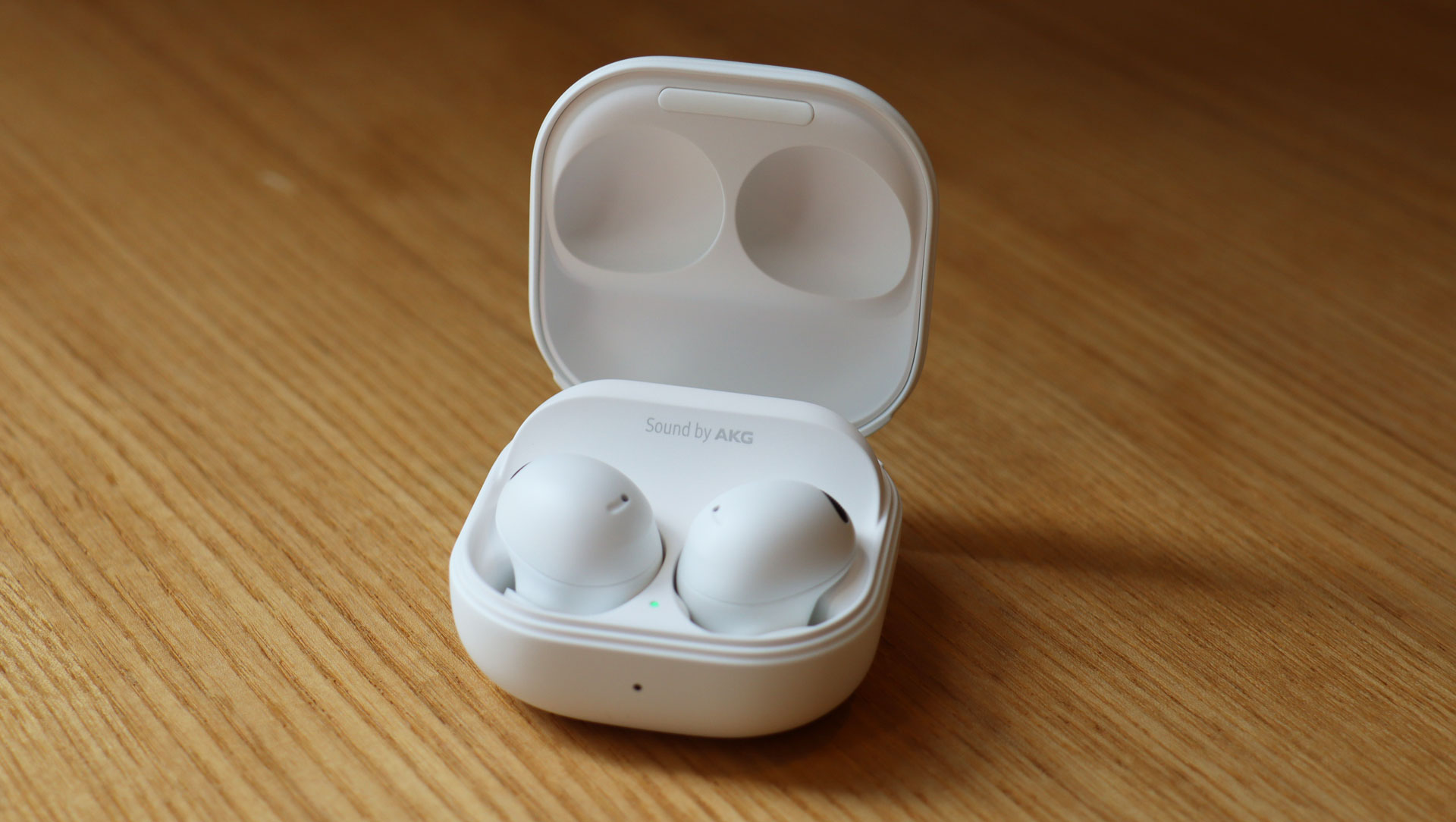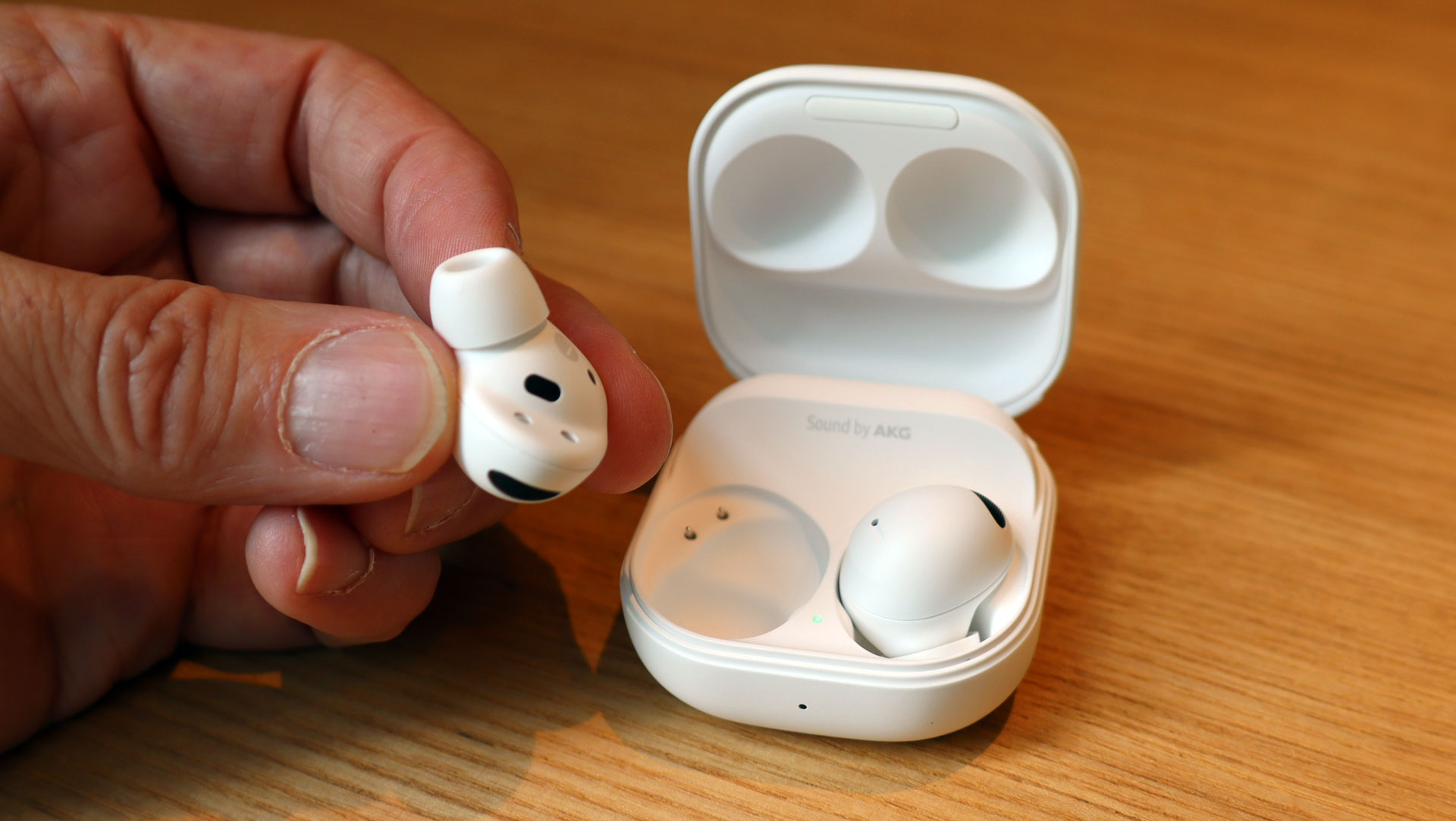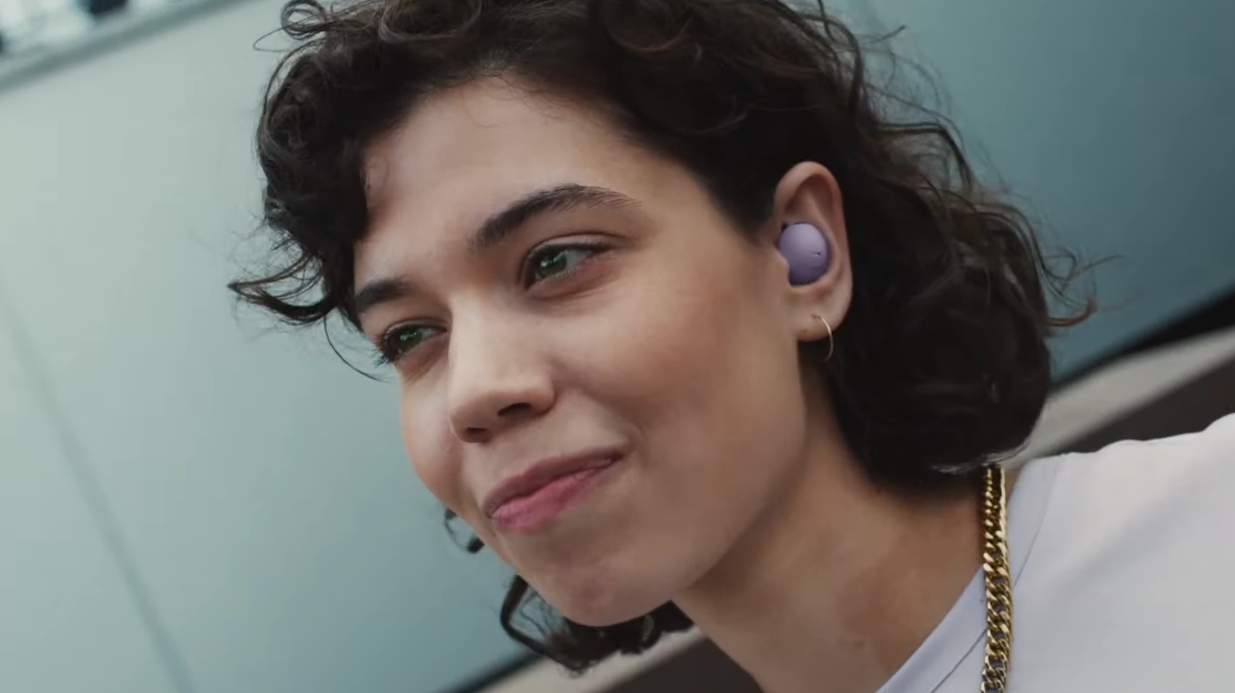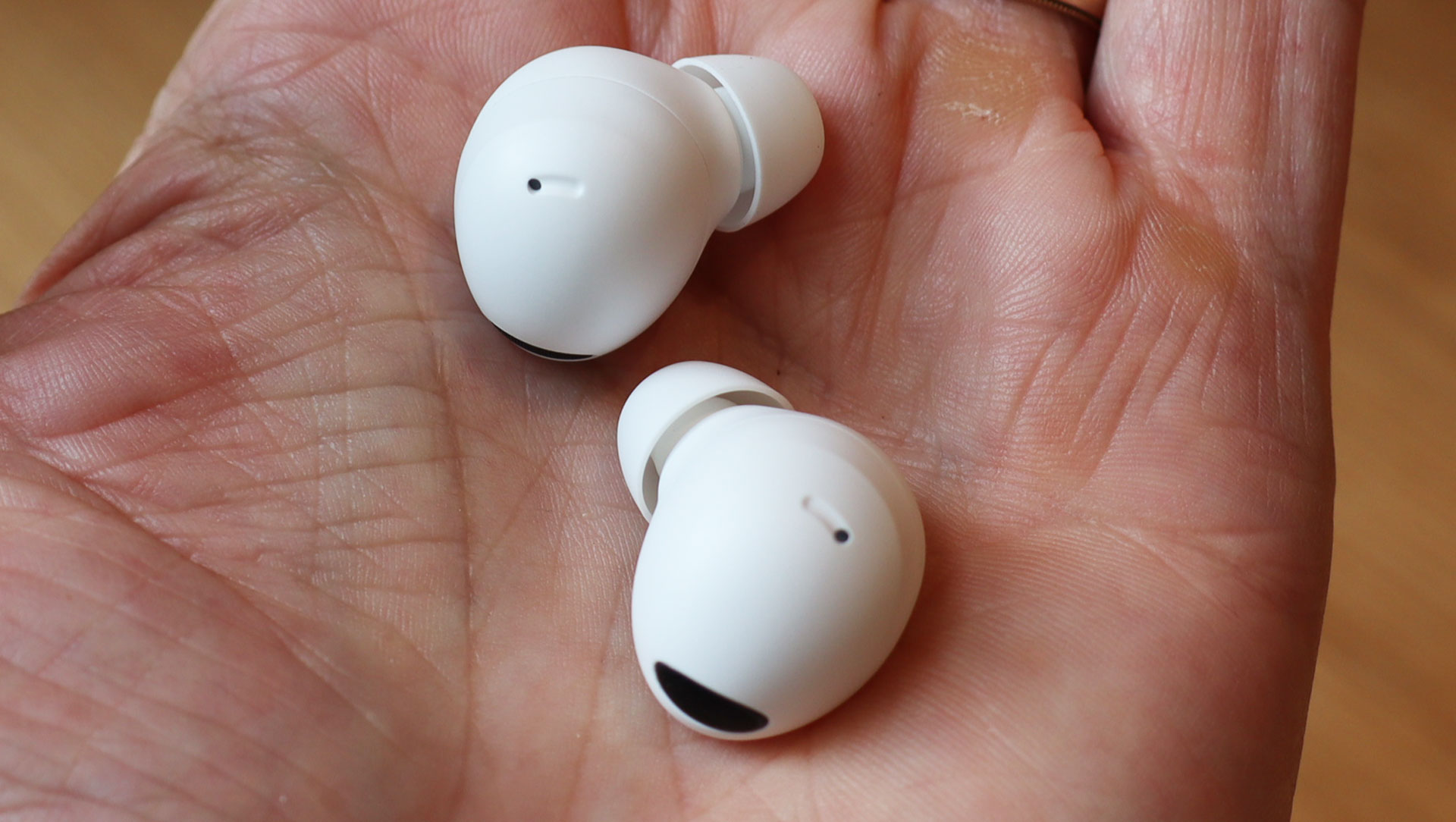5 ways Samsung Buds 2 Pro beat AirPods Pro, and 1 way they lose
Hi-res audio, smart noise cancelation, more advanced speakers – the Buds 2 Pro have a lot going for them

Sign up for breaking news, reviews, opinion, top tech deals, and more.
You are now subscribed
Your newsletter sign-up was successful
At the Samsung Unpacked 2022 event, Samsung has just unveiled its latest round of new products, including the Samsung Galaxy Buds 2 Pro – its new noise-canceling wireless earbuds – alongside the Samsung Galaxy Flip 4, Samsung Galaxy Fold 4, and Samsung Galaxy Watch 5 Pro.
The Samsung Buds 2 Pro are really gunning for the best wireless earbuds out there, with a whole suite of advanced upgrades over the original Samsung Galaxy Buds Pro that have really impressed us on paper.
But they're not just improvements when compared to the original Samsung Buds Pro, though – they also feel like they're aimed straight at the heart of Apple's AirPods Pro, which are the most popular noise-cancelling earbuds available today.
Some of the features Samsung has included seem to be nearly exact matches for features we're used to in AirPods Pro: there's '360 Audio' support, for example, which promises a version of the Spatial Audio tech delivered by AirPods Pro; and there's the ability to autoswitch between different Samsung devices you're signed into, now including your Samsung TV, in much the same way that you can switch AirPods over to your Apple TV 4K.
In other areas, though, Samsung has gone beyond what you can get from AirPods Pro. Way beyond in some cases.
We've only just started testing the Galaxy Buds 2 Pro – but based on the specs and what we've heard so far, Samsung might be about to give Apple something to worry about.
Here are six ways the Samsung Buds 2 Pro's spec list beats the AirPods Pro, and why we think they're so significant.
Sign up for breaking news, reviews, opinion, top tech deals, and more.

1. More advanced speakers
The Samsung Buds 2 Pro feature a two-way speaker design, which is still pretty rare in wireless earbuds these days. This means you have two drivers in the earpiece: a larger unit for the mid-range and bass, and a smaller unit for treble. In this case, you've got a 10mm woofer and 5.4mm tweeter.
When we have seen two-way designs in wireless earbuds, they've really impressed us. The Bowers & Wilkins PI7 are absolutely astounding when it comes to sound quality (albeit in a very chunky earbud), and the Honor Earbuds 3 Pro have a major advantage over AirPods Pro when it comes to the sound (in the same size of earbud).
Assuming Samsung gets its audio engineering right, the two-way design should get you deeper and richer bass that's still controlled, better clarity in vocals and instruments in the mid-range, plus more detailed treble that's elevated from the rest of the mix for clarity.
2. Hi-Res 24-bit audio support
Samsung has revealed that the Galaxy Buds 2 Pro will include high-quality 24-bit music support, when used with compatible Samsung devices, thanks to the 'Samsung Seamless Codec'.
We don't have full details on exactly what this codec can do, but we do know that Samsung's Scalable Codec is capable of handling 24-bit/96kHz audio streaming, with bitrates of up to 512kbps, so that's likely the minimum support we're talking about here.
This means you could really take advantage of the higher-quality streaming tiers from Tidal or, ironically, Apple Music, which has lossless and hi-res music that can't be played in full quality on any AirPods so far. AirPods Pro don't have any kind of lossless music support, though it's rumored that AirPods Pro 2 may change that. But Samsung has got in first.
What does 24-bit music streaming mean in practice? Put simply, it means more detail can be included in the music file – the music files have to be larger, but there can be more precision (and less digital sanding off) in the find details. There's some major debate over just how much of an advantage 24-bit audio is over 16-bit – and, again, it depends on how well Samsung has engineered the buds – but it's clear Samsung is aiming high here.

3. Smarter noise cancelation
We won't know whether the actual quality of Samsung's active noise cancelation will beat the very good ANC in AirPods Pro (in particular, Samsung's struggled with wind noise in the past, which Apple handles as well as anyone else in the business).
However, they keep a great concept from the original Galaxy Buds Pro: Voice Detect. If you start speaking to someone, the earbuds should automatically switch into their Ambient mode – so you don't need to manually trigger it when you order a coffee or something like that. You can just say hello and start your order, and you should be able to hear the response because they've already started letting sound in.
It's a smart feature… but it didn't work all that smoothly on the original Galaxy Buds Pro. If the new mic setup on the Buds 2 Pro works better, then it could be a winner over the competition.
4. Better waterproofing
The Samsung Buds 2 Pro are IPX7 waterproof, which is rare in earbuds, and it might be a lifesaver. Well, a budsaver. This means they can be dropped into water up to 1m deep for up to 30m, and should survive.
Most earbuds (including AirPods Pro) tends to be IPX4 rated at most, which in the case of buds basically means 'sweat-resistant'. Any contact with an actual body of water would be rolling the dice.
It's impressive that Samsung has gone for IPX7, which is basically one level down from what you get in proper waterproof headphones – if you have a bud-dropping accident by a puddle, bath or pool, you might be very grateful of it.

5. Next-gen Bluetooth support
Samsung has included Bluetooth 5.3, which is the very latest version of the wireless tech. There are two advantages to this: first is new and improved Bluetooth LE audio quality; the second is (potentially) AuraCast support.
The upgrade to Bluetooth LE (low energy) basically means that when the earbuds and your device are struggling to maintain a solid connection (due to distance, for example), you'll maintain a better quality of sound than in previous versions.
Meanwhile, Bluetooth AuraCast is a new tech that can potentially enable lots of Bluetooth headphones to all listen to a broadcast from the save device, so you and friends could watch from one phone, or you could be quietly listening to sound from a big projector screen in a public space. This tech actually needs support from your phone as well as your headphones, but so it's not a slam dunk that you'll get the full effect from the Buds 2 Pro, but supporting Bluetooth 5.3 means it's possible – AirPods Pro feature Bluetooth 5.0, so don't get these features.
The negative: Battery life looks weak
The element of the Samsung Buds 2 Pro that most concerns us is the battery life. At five hours from the buds per charge with ANC on, and 18 total including charge from the case, they're not especially impressive.
The five hours is rated slightly higher than AirPods Pro, which officially offer 4.5 hours, though they usually give you more like five hours anyway.
But the AirPods Pro give you 24 hours including the case, which is a major improvement over what you get from the Buds 2 Pro – and running out of charge in the case is the most annoying part.
The new Buds 2 Pro are 15% smaller than their predecessors, which is nice, and we don't mind a shorter battery in the buds if it keeps them small and light – but to have a shorter battery in the case as well could lead to frustration.
Will this hold them back when comparing them to the best noise cancelling earbuds? We'll find out soon.

Matt is TechRadar's Managing Editor for Entertainment, meaning he's in charge of persuading our team of writers and reviewers to watch the latest TV shows and movies on gorgeous TVs and listen to fantastic speakers and headphones. It's a tough task, as you can imagine. Matt has over a decade of experience in tech publishing, and previously ran the TV & audio coverage for our colleagues at T3.com, and before that he edited T3 magazine. During his career, he's also contributed to places as varied as Creative Bloq, PC Gamer, PetsRadar, MacLife, and Edge. TV and movie nerdism is his speciality, and he goes to the cinema three times a week. He's always happy to explain the virtues of Dolby Vision over a drink, but he might need to use props, like he's explaining the offside rule.